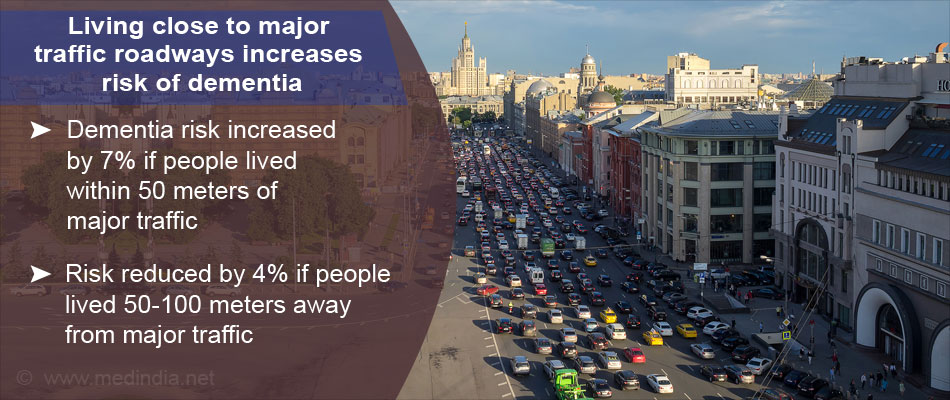
- Pollutants from heavy, day-to-day traffic increases the risk of dementia.
- This is because air pollutants can get into the brain via the blood stream and lead to dementia.
- Pollutants did not increase risk of other neurological conditions like Parkinson's disease or multiple sclerosis.
Study
Between 2001 and 2012, researchers identified 243,611 cases of dementia, 31,577 cases of Parkinson's disease, and 9,247 cases of multiple sclerosis in Ontario.
To investigate the correlation between living close to major roads and dementia, Parkinson's disease and multiple sclerosis, the researchers examined records of more than 6.5 million Ontario residents aged 20-85 years.
The individuals' proximity to major roadways was mapped using the postal code of their residence.
The findings indicate that living close to major roads increased the risk of developing dementia, but not Parkinson's disease or multiple sclerosis.
- 4% if people lived 50-100 meters from major traffic
- 2% if they lived within 101-200 metes from major traffic
- no risk of dementia was found over 200 meters of major traffic
"Little is known in current research about how to reduce the risk of dementia. Our findings show the closer you live to roads with heavy day-to-day traffic, the greater the risk of developing dementia. With our widespread exposure to traffic and the greater tendency for people to live in cities these days, this has serious public health implications," says Dr. Hong Chen, environmental and occupational health scientist at PHO and an adjunct scientist at ICES.
"Our study is the first in Canada to suggest that pollutants from heavy, day-to-day traffic are linked to dementia. We know from previous research that air pollutants can get into the blood stream and lead to inflammation, which is linked with cardiovascular disease and possibly other conditions such as diabetes. This study suggests air pollutants that can get into the brain via the blood stream can lead to neurological problems," says Dr. Ray Copes, chief of environmental and occupational health at PHO and an author on the paper.
The findings of this paper could be used to help inform municipal land use decisions as well as building design to take into account air pollution factors and the impact on residents.
This research was conducted in collaboration with scientists from the University of Toronto, Carleton University, Dalhousie University, Oregon State University, and Health Canada. The study was funded by Health Canada.
Dr. Hong Chen is lead author on the paper titled Living Near Major Roads and the Incidence of Dementia, Parkinson's Disease, and Multiple Sclerosis: A Population-based Cohort Study. The study is published in The Lancet.
Reference
- Hong Chen et al. Living near major roads and the incidence of dementia, Parkinson's disease, and multiple sclerosis: a population-based cohort study. The Lancet; (2017) doi.org/10.1016/S0140-6736(16)32399-6
Source-Medindia












